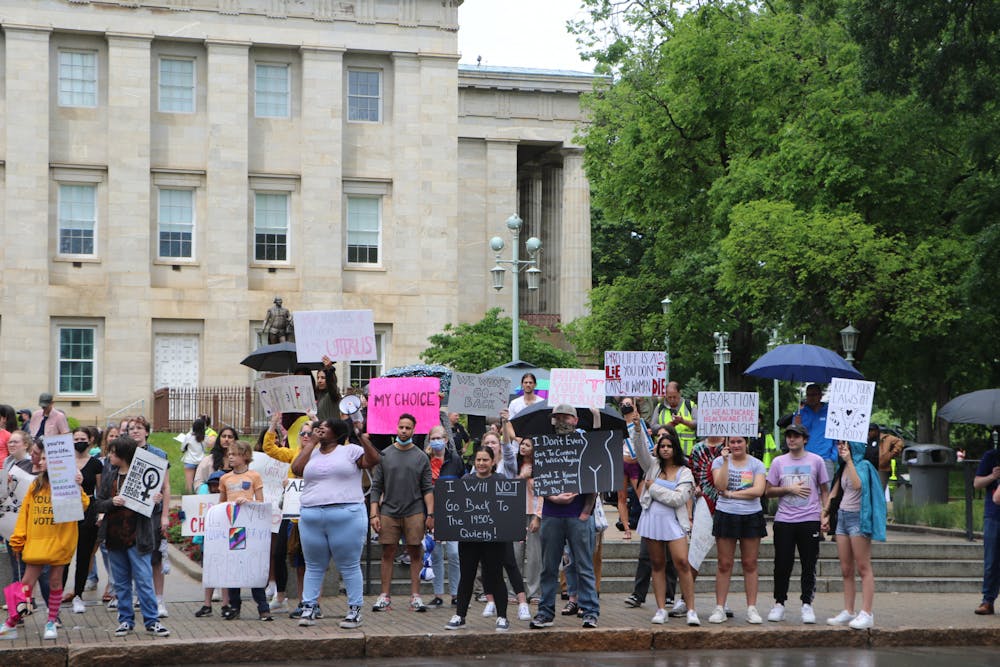Students across a range of different political backgrounds shared divided opinions about North Carolina’s new 12-week abortion ban. While some saw it as a step in the right direction, others worried about the ban's implications for low-income women.
The Care for Women, Children and Families Act, which goes into effect July 1, passed into law after Republicans in the North Carolina General Assembly overrode Gov. Roy Cooper's veto of the bill in May.
The act allows for exceptions up to 20 weeks for cases of rape and incest, up to 24 weeks for “life-limiting” fetal anomalies and has no limit if a physician deems a mother’s life in danger. The law requires in-person doctor visits to end abortions with a pill at 10 weeks.
Prior to the ban’s passage, North Carolina law prohibited abortions after 20 weeks, with exceptions for medical emergencies. However, the law had not been enforced since 2019, allowing abortions until “fetal viability,” which is the point where a human fetus can survive outside the uterus and generally occurs between 23 and 24 weeks.
For junior Dena Levin, co-president of Duke’s chapter of Planned Parenthood Generation Action, the ban came as no surprise given the results of the 2022 midterm elections. In November, North Carolina House Republicans fell one seat short of a supermajority in the midterm election. The Republican Party gained a supermajority after North Carolina Rep. Tricia Cotham changed her party affiliation from Democrat to Republican in April.
“It’s also really terrifying because North Carolina still does serve as a hub for a lot of women across the South to receive abortions,” she said. “The fact that the time that they're able to receive [an abortion] has been cut by so much is honestly just really scary for a lot of low-income women, women who are in domestically abusive relationships [and] minors.”
Sophomore Sherman Criner, a North Carolina native, was also not surprised by the implementation of the new legislation, citing recent right-leaning trends among the state’s voters. Criner believes that the election of ardently pro-life Lieutenant Gov. Mark Robinson and former President Donald Trump’s victories in North Carolina in both the 2016 and 2020 elections hint that the state is “becoming increasingly red.”
“I can't really say I'm that surprised, but I can see why a lot of Duke students are surprised, especially being in Durham,” Criner said, referring to how 80.4% of Durham County residents voted in favor of President Joseph Biden in the 2020 election.
Criner supports the new ban, calling it “a step in the right direction.” However, he believes that the 12-week limit is more of a compromise than many Republicans initially wanted and that the 20-week and 24-week exception periods included in the bill are “kind of arbitrary.”
While he would support a full abortion ban with limited exceptions, Criner notes that it would need to be paired with a robust adoption system. Criner pointed to the roughly $160 million in spending contained within the legislation for maternal health services, foster and adoption care and contraceptive access. He feels that these features in the bill are “really helpful” but not widely known.
Junior Rachel Kitto, a member of Duke Sexual Harassment and Assault Prevention & Education, pointed out that socioeconomic inequalities are inherent in the 12-week ban, even with support given to maternal health services and foster care.
“I think that any restrictions on reproductive health are targeted at people who are socioeconomically disadvantaged,” Kitto said. “It’s bad, but it's bad for a number of reasons. Typically, the states that are the most restrictive when it comes to reproductive rights tend to also be the ones that care the least and provide the least for children.”
While she does not believe in banning abortion under any circumstances, Kitto thinks that states seeking to ban abortion are “morally required” to “completely up their game with social welfare.” She does not believe states that have passed abortion laws have done so.
According to Kitto, banning abortion reveals a “democratic backsliding,” especially regarding the rights of women and non-cisgender men. Her work with SHAPE has made it “even more apparent” that these groups “are constantly put in this subjugated position,” she said.
Like Criner, sophomore Zander Pitrus supports the ban but believes the timeframe of 12 weeks was a “fettered compromise.”
“It still needs to be reduced,” Pitrus said. “Twelve weeks is a long time, and during this period of 12 weeks, the heartbeat is heard, the baby's body structure and organ systems develop and the brain can be seen.”
Commenting on the bill’s exceptions to the 12-week ban, Pitrus added that abortions due primarily to cases of rape or incest make up less than 1% of all abortions. He pointed to a 2008 study reporting that half of all abortion patients reported having one or more prior abortions, although more recent data from 2021 reports that 58% of women who have an abortion are doing so for the first time.
Kitto concluded that the 12-week ban made her feel like the country was “backpedaling.”
“It's ironically funny in a very sad way that America considers itself this huge leader in democracy, economy, science and whatnot,” Kitto said. “And then now we're taking steps to actively reverse the progress that as a country, over so many decades, we have made.”
Jazper Lu contributed reporting.
Get The Chronicle straight to your inbox
Signup for our weekly newsletter. Cancel at any time.

Ishani Raha is a Pratt junior and a senior editor of The Chronicle's 119th volume.

